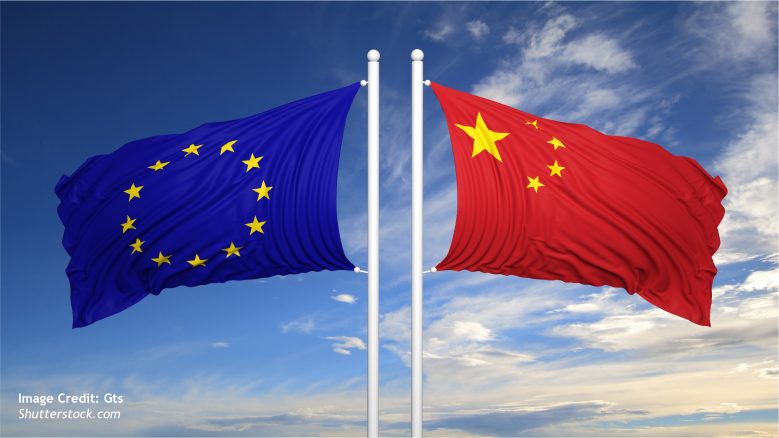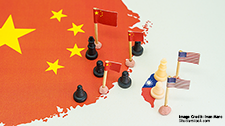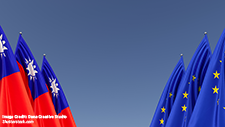Collective Self-Defense Against Authoritarianism: Lessons for EU

Zsuzsa Anna Ferenczy, Niklas Swanström, Fredrik Erixon, Roland Freudenstein, Liselotte Odgaard, Chienyu Shih, Jonathan Ping, Jagannath Panda and Kyoko Hatekeyama
Executive Summary:
- Economic coercion and disinformation have been a clear factor in Europe’s ties with both China and Russia. They are part of the reactionary policy used by authoritarian regimes to undermine liberal democracies and strengthen their influence. China’s sanctions on European countries and Russia’s pressure on Ukraine and other former Soviet territories present serious threats to Europe. The boycott of Lithuanian goods by China following Lithuania’s decision to allow a representative office under the name of Taiwan instead of Chinese Taipei demonstrated the severe impact that China can have on the EU Single Market.
- As Europe’s strength lies within its economy, Collective Economic Self-Defense (CESD) is crucial for Europe to sustain its strategic power and better coordinate financial and international approaches with like-minded powers against future economic coercive measures of authoritarian states like Russia and China.
- In confronting such economically coercive behavior of authoritarian regimes, Europe will need to adopt a strategy of deterrence and economic sovereignty. Such a strategy will be based on five key tenets: boosting economic dynamism, building and empowering strategic alliances, joining the ‘Pacific Century’, investing in international institutions, and deterring China and Russia.
- First, Europe needs to boost its economic dynamism and make itself a region where future innovation and technology is shaped. This will make it harder for autocratic regimes to dismiss Europe and they will take less risks in challenging the security order.
- Second, Europe should develop alliances with the US and other market-oriented democracies (OECD members) and reduce dependency on autocracies such as China. Stronger partnerships with India and Japan in Asia must be explored. A middle-power connect in the Indo-Pacific should also be envisioned with countries like Australia, and factoring India and Japan in a broader context.
- Third, Europe needs to develop its economic and geo-political strategy towards the Indo-Pacific region to maintain relevance in the world economy and factor into America’s foreign policy.
- Fourth, Europe should stop acting unilaterally and seek cooperative solutions first in order to safeguard the integrity of international institutions.
- Finally, in order to improve strategic autonomy, Europe must decrease its dependency on China and Russia. They should also introduce economic deterrence against these states in the form of policies that can respond to challenges to their strategic interests and to the rules-based liberal international order.
- The EU already plans to develop an Anti-Coercion Instrument to defend the EU Single Market and fundamental European values. This instrument will work alongside investment screening, protective technology policies and programs like the Global Gateway.
- Furthermore, the EU must act more boldly in confronting China vis-à-vis its tactics, in tandem with the US. Brussels cannot only play defense against threats; it needs a comprehensive approach and to strategically use the economic power of member-states while working closely with like-minded partners. Global solidarity of democracies, with the transatlantic partnership at its core, remains hugely important. Moreover, cooperation must emphasize mercantilist policies to ensure continued political freedom and economic development in a global context to counter hegemonism.
- To be within a community that accepts pluralism, debate, and the rule of law, states must work together and compete within a transparent expanding market that they must create to deter PRC hegemonism. Viability also depends on states aligning policies in a mercantilist manner to create new markets free of the unreliable (e.g., lowering tariffs, standardizing procedures and product standards, building infrastructure, providing aid for trade, tax incentives, free trade zones, education, and promotional support).
- Due to the challenges of the EU’s multi-layered decision-making process, the EU needs a positive geo-economic agenda to manage its own fragmentation and build a more resilient and competitive economic bloc that is able to defend its interests against authoritarianism.
- China is threatening Europe’s centrality as a player in the global ship-building industry and is poised to dominate the industry entirely. China’s dominance not only threatens European competitiveness but could also give it the immense influence to set international ship-building standards in China’s favor. It also presents a security challenge for Europe (and the international community) while China looks to become an independent arms manufacturer in the maritime domain.
- To save the European ship-building industry, Europe must match China’s enormous financial resources through policies that enable European companies to enjoy economies of scale. European shipbuilding must win the technology race with China by developing a competitive carbon-neutral vessel. To achieve this, the EU will need to facilitate public-private sector partnerships to invest in the industry’s overall development.
- China’s policy toolkit—consisting of direct coercive threats, bribery, indirect influence and social infiltration—is amply visible in Taiwan, which falls under Beijing’s ‘One China Principle’, where it has faced a growing resistance demonstrated in social movements and civil society. Although geographically distanced from Europe, such coercive measurements may destroy the core values of European civilization.
- European countries should reconsider their commitment to the ‘One China Principle’ and strengthen ties with Taiwan, which has experienced decades of harassments. Such cooperation, specifically with Taiwanese policy think-tanks and social/professional organizations, would not only provide a better understanding of China’s tactics in international politics but also valuable practical learning experiences.
- In response to China and its coercive economic diplomacy, the EU and India have reaffirmed their commitment to uphold democratic values by advocating a multipolar and rules-based order. Drawing on this commitment, the EU and India should aim to build a middle power-driven economic cooperation as it would enhance EU-India ties and further enable them to manage the economic coercive authoritarianism posed by China as well as tackle other players like Russia.
- Russia emerges as another key factor in the discussion of authoritarianism as it has moved towards more coercive economic policies. As the EU-Russia relationship declines because of the tensions over Ukraine, Russia remains an essential defense partner and a valuable partner within multilateral forums to India. Despite the different perceptions on Russia, this can provide a platform for negotiations and cooperation to balance EU-Russia ties with the help of India.
Related Publications
-
The US and EU, and the Emerging Supply Chain Network: Politics, Prospects, and Allies
The Global Supply Chains have evolved from simply logistical achievements to being the bedrock of the global economy. Driven by technological advances and geopolitical shifts, this transformation underscores the critical […]
-
Taiwan-PRC Crisis: What Cross-Strait Conflict Could Cost Europe
The escalating tensions between Taiwan and China pose significant economic and strategic challenges to the European Union, such as the inaccessibility of Taiwanese inputs, market, and capital. This issue brief […]
-
Japan’s Energy Security in the Persian Gulf: Caught Between New and Old Challenges
The goal of this paper is to investigate the evolution of Japan’s energy strategy in the Persian Gulf and understand how intra-Asian competition for business opportunities in the region can […]
-
EU-Taiwan Semiconductor Supply Chain: Resilience amid the Digital and Green Transition
As the European Union (EU) sets ambitious goals of maximizing a ‘Digital Decade’ through its Digital Transition plan and attaining carbon neutrality in its Green Transition plan, technology becomes the […]
-
Strategic Trade Dynamics: Unpacking De-risking and De-coupling in EU-China Relations
What goes on between the EU and China is of vital significance to global trade and our efforts to provide economic stability. Right now, the EU-China trade relationship could be […]




